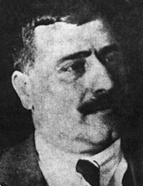

This was how the Cadernos presented themselves from the very first issue, which focused on Democracia, sua origem, sua eclosão e seu triunfo [The Origin, Outbreak and Triumph of Democracy], by RM. It was an ambitious programme, like many others that arose from the euphoria following the war and the triumph of the democracies, which many believed would extend to Portugal. The ambitious plan of the Cadernos Históricos [Historical Notebooks], however, remained unfinishe d, ending at its 15th edition. RM (Rocha Martins) had increasingly aligned himself ideologically with the republicans, as his democratic liberalism naturally led him in that direction — especially after the death of the last constitutional monarch, King Manuel II, in 1932, which freed him from any obligation of loyalty to the monarchy.
The Cadernos were not the end of his work, however, as he also edited Vermelhos, brancos e azuis: homens de Estado, homens de armas, homens de letras [Red, White, and Blue: Statesmen, Soldiers, and Writers] and other works. These were biographies of prominent figures, briefly presented as interconnected, from the perspective of both a historian and a journalist. The bulk of Rocha Martins' historical work can be seen as part of a significant 19th-century journalistic and chronicling tradition of memorialising the past, particularly contemporary events. Notable examples include Manuel Pinheiro Chagas, Joaquim Martins de Carvalho, Barbosa Colen, and Alfredo Galis. However, after 1939, he wrote no more monographic works, except on the Governo Provisório da República (1910-1911) [Provisional Government of the Republic (1910-1911)]. This was, after all, a calm reckoning with the Republic, which he had not initially supported.
He frequently sought to document his historical writings, collecting archival materials so that the reader could verify the many judgements he made — often in great number. In particular, he favoured private correspondence, which enabled him to depict historical figures more directly, delving into their personal lives and evoking their presence more vividly. His writing — best described as neo-romantic — is full of metaphors, aiming to bring the characters in his narratives to life. As a narrator, he did not hesitate to express his opinions and judgements, guiding the reader and shaping the direction of the plot. He often sought stylistic effects and was not shy about exaggerating them. His approach to writing history centred on conveying what he called the "ambience of the moment" or the "atmosphere" experienced by the protagonists — a sort of epic quality that he aimed to achieve, perhaps inspired by superficial and hurried readings of Michelet. Thus, if it was not always history, it was almost always literature: "Hatred lurked in the guise of respect; anger watched him, smiling flatteringly; subservience, which had turned into ingratitude, was ever-present at his side; but he, overwhelmed by the colossal task, devoted himself to it in that room, where massive notebooks piled high." This is how he described the Marquis of Pombal and his tireless governance on the eve of King José’s death (O marquês de Pombal..., 1939, 13). His search for emotion and dramatic effect was evident in the themes he chose and the titles he gave to his writings. For example, "Processos célebres da História de Portugal" [Well-known Processes in the History of Portugal] (announced collection), where the work he proposed to begin, O marquês de Pombal desterrado [The banishment of Marquis of Pombal] as a prime example. Rocha Martins did not seem to master the period of monarchical constitutionalism — or at least he did not focus on describing or explaining it in depth. He was more inclined to major political upheavals than to the minutiae of "normality," which did not suit his temperament as a writer excited by the dramas and conflicts of society. At the same time, he sought to indulge his passion for dramatic descriptions, conflict, and his deep love for the nation, which he consistently endeavoured to highlight — most notably in 1929 and later in 1933 with História de Portugal [History of Portugal] and História das Colónias Portuguesas [History of the Portuguese Colonies] . Both works were considered "patriotic work." putting history at the service of the nation, much like Os Lusíadas [The Lusiads] served as spiritual nourishment for patriotic sentiment.
This work is financed by national funds through FCT - Foundation for Science and Technology, I.P, in the scope of the projects UIDB/04311/2020 and UIDP/04311/2020.
